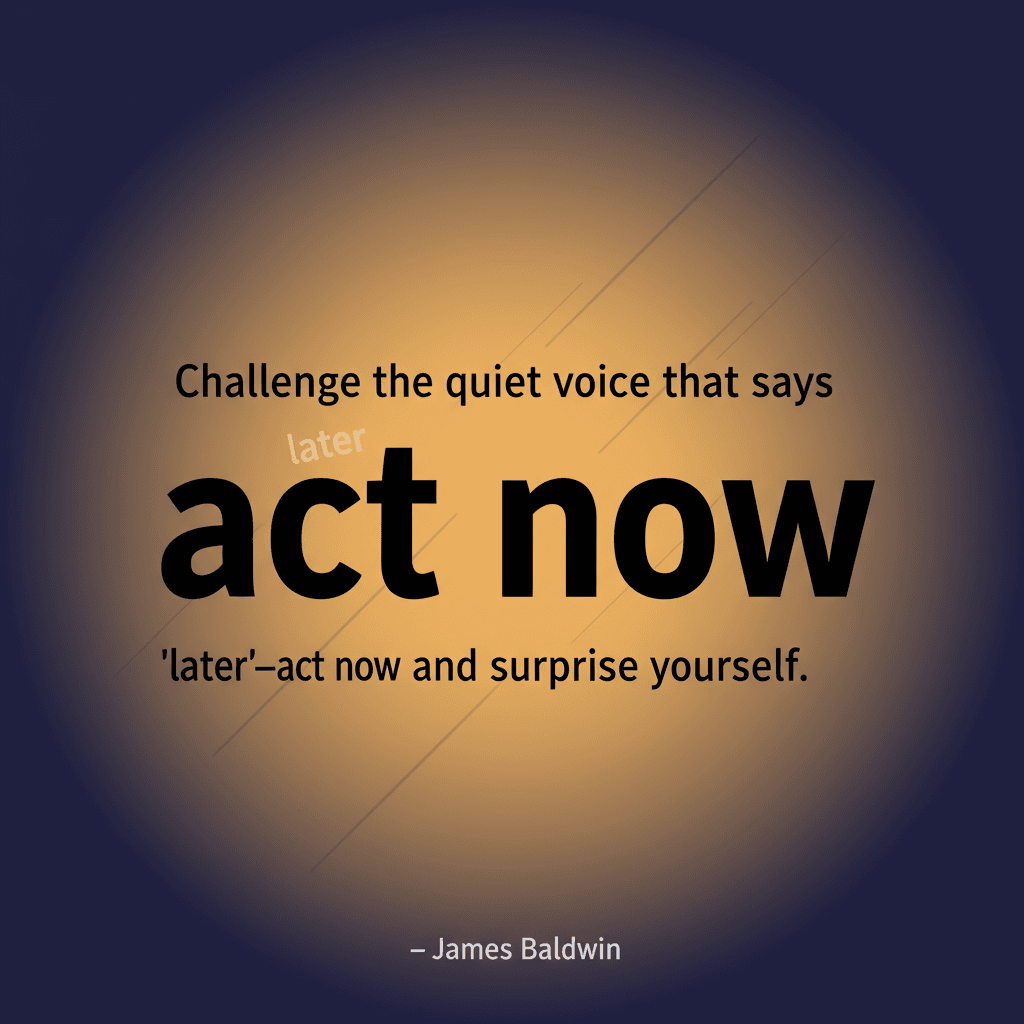Defy Later: Act Now, Astonish Yourself

Challenge the quiet voice that says 'later'—act now and surprise yourself. — James Baldwin
Hearing the Whisper of Delay
The line challenges the gentle, plausible murmur that says “later”—the voice that sounds reasonable while quietly shrinking our lives. Baldwin’s phrasing urges a confrontation: not with some grand enemy, but with the subtle habits that defer courage. Once we notice that whisper, the terrain shifts; postponement is not a scheduling choice but a story we repeat. From there, action becomes an editorial correction—one decisive line that revises the narrative in real time.
Baldwin’s Leap as Living Evidence
The advice gains muscle when we recall Baldwin’s own gamble: in 1948 he left New York for Paris with little money and no safety net. There, he carved space to write the work that launched him—Go Tell It on the Mountain (1953)—and later expanded his voice in essays that reshaped public discourse. The pivot was not elaborate; it was a move made now. Thus, his life illustrates how a single act, taken before certainty appears, can widen the future’s doorway.
The Hidden Cost of Waiting
Procrastination rarely feels dangerous in the moment, yet research shows its toll accumulates. Psychologists Fuschia Sirois and Timothy Pychyl (2013) documented links between chronic delay, stress, and poorer well-being, noting that “later” often masks short-term mood repair at long-term expense. Seen this way, acting now is less a hustle mantra than a form of care: it reduces ambient anxiety and restores agency. In short, urgency is not panic—it is stewardship of attention.
How Small Starts Unlock Follow-Through
If “now” feels daunting, shrink the doorway. David Allen’s two-minute rule (2001) and BJ Fogg’s Tiny Habits (2019) show that very small actions create reliable traction. Moreover, Peter Gollwitzer’s work on implementation intentions (1999) demonstrates that specifying when and where you’ll act (“If it’s 7 a.m., then I’ll draft the first sentence”) dramatically boosts follow-through. By engineering a start so easy it’s hard to refuse, you convert intention into motion before hesitation rallies.
Surprise Yourself: The Chemistry of Momentum
Once you begin, progress generates its own reward. Neuroscience on reward prediction error (Schultz et al., 1997) shows that unexpectedly positive outcomes spike learning signals, turning small wins into motivation. Teresa Amabile’s The Progress Principle (2011) likewise finds that everyday forward steps are potent drivers of engagement. Thus, the “surprise” Baldwin promises is not mystical; it’s the felt jolt of discovering you’re already moving—and better than you feared.
From Private Courage to Public Voice
Finally, immediate action scales. Baldwin’s presence at the Cambridge Union in 1965—debating William F. Buckley—did not arise from waiting for perfect conditions; it flowed from years of practiced candor that started on the page, now. The Fire Next Time (1963) began as a letter, then transformed into a national reckoning. Likewise, our smallest timely acts can compound into public consequence. Begin privately; persist publicly; let the results surprise you next.